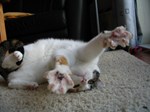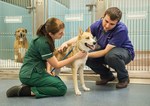Search - Research
1 - 10 of 388 results
-
Animals make light work of walking
The range of footfall patterns seen in walking amphibians, reptiles and mammals - including hippopotamus, horse and (inverted) sloth - are consistent with simple principles of mechanical work minimisation. One of the fundamental objectives of … -
The RVC calls for vets to participate in survey to help shape the future of epilepsy research
The Canine Epilepsy Research team at the (RVC is calling for general practice vets to participate in a vital survey being conducted on canine epilepsy therapiesThe Canine Epilepsy Research team at the Royal Veterinary College (RVC) is calling for general …
-
Galloping isn’t such hard work for horses
For the first time, external mechanical work in galloping racehorses has been measured using force plates as ergometers. The results of this study, conducted by Royal Veterinary College (RVC) researchers in the Structure and Motion Laboratory, have … -
RVC team publish work on oestrus suppression in the mare
Dr Madeleine Campbell, Dr Mandi de Mestre, Professor Ken Smith, Daniel Hampshire, Dr Belinda Rose and Lauren Hamstead have recently published the results of their HBLB funded work on the development of a welfare-friendly, ethical method of oestrus …Dr Madeleine Campbell, Dr Mandi de Mestre, Professor Ken Smith, Daniel Hampshire, Dr Belinda Rose …
-
Nutrition breakthrough to help manage dogs with epilepsy
RVC research nutrition breakthrough to help manage dogs with epilepsyResearch from the RVC canine epilepsy clinic leads to the development of the first and only diet to …
-
First ever systematic review and meta-analysis of adverse effect of antiepileptic drugs in canine epilepsy
Researchers found that much of the evidence for the medical treatment of canine epilepsy was based on subpar reporting of adverse effect and in studies that were below the expected standard.How safe are antiepieleptic drugs? RVC research sheds light on epilepsy treatments.
Researchers …
-
VetCompass study reveals new insights on seizures and epilepsy in cats
Neurological disorders are supposedly a leading cause of death in cats but, until now, there has been little information on how commonly cats are affected by seizure disorders or epilepsy. The latest VetCompass study shines new light on these … -
RVC study sets the agenda for the future of canine epilepsy research
RVC study sets the agenda for the future of canine epilepsy researchA new study, conducted by the Royal Veterinary College (RVC), has identified improving drug …
-
World first, RVC finds cognitive impairments in dogs with epilepsy
A series of pioneering research studies from the Royal Veterinary College (RVC) into dogs with epilepsy have revealed that: Dogs with epilepsy find it harder to obey commands, are slower to learn new tricks, have spatial memory deficits and are easily distracted. Aversive training methods, such as bark-activated collars, prong collars and verbal punishment are associated with poor trainability and their use should be avoided. Some anti-epileptic drugs (the medications commonly used to treat seizures) were found to worsen the cognitive impairment of dogs with epilepsy. Dogs with greater exposure to training activities, including obedience classes, agility, and gun-dog training, were found to be associated with higher trainability and have fewer signs of cognitive dysfunction.You can’t teach epileptic dogs new tricks? A series of pioneering research studies from the Royal …
-
RVC research sheds light on epilepsy treatments — Why don’t the fits stop?
New research from the Royal Veterinary College (RVC) canine epilepsy clinic has shed light on why some dogs do not respond to anti-epilepsy treatments. The study found that dogs that experience more than one seizure a day and male dogs were less …New research from the Royal Veterinary College (RVC) canine epilepsy clinic has shed light on why …








